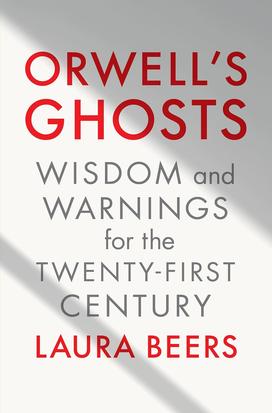Historian Laura Beers ’00 Revisits Orwell’s Words
The book: George Orwell is back. But what does it really mean to be Orwellian? In Orwell’s Ghosts (Norton), historian Laura Beers ’00 explains why all sides of the culture wars are leaning into Orwell and his philosophies. Beers unpacks the free thinker’s perspectives on political truth, class, socialism, and more to see the lessons his words offer modern audiences. It’s been 75 years since his iconic book 1984 was first published, but arguably it’s as relevant as ever.

The author: Laura Beers ’00 is a historian and professor of history at American University. She earned her undergraduate degree in history from Princeton and went on to earn her master’s and Ph.D. from Harvard. She studies modern Britain with a focus on the ways politics is both influenced and shaped by cultural and social life. Beers is the past-executive director of the North American Conference of British Studies and the author of many books including Red Ellen and Your Britain.
Excerpt:
Introduction
What’s Orwellian?
We are living in an Orwellian moment, although not in the sense that many political and cultural commentators understand the term. In recent years, with the rise of “cancel culture,” “fake news,” and concerted disinformation campaigns, invocations of Orwell and his classic dystopian novel 1984 have reached new heights. Conservatives have accused both their governments and the mainstream media of carrying out an “Orwellian” campaign of information management. In the aftermath of the January 6, 2021, insurrection at the U.S. Capital, Republican Senator Josh Hawley compared the cancellation of his book contract to life in Orwell’s 1984. Right-wing critics branded President Biden’s now defunct Disinformation Governance Board within the Department of Homeland Security as a new “Ministry of Truth” in 2002. And, in June 2023, Supreme Court Justices Neil Gorsuch and Sonia Sotomayor ’76 argued over whether a Colorado public accommodations law that would compel a web designer to create a wedding website for a gay couple could be construed as “Orwellian thought policing” in their majority and dissenting opinions in 303 Creative LLC v. Elenis.
The left, too, has embraced the rhetoric of Orwellianism, turning the term against former U.S. President Donald Trump, as in Adam Gopnik’s 2017 New Yorker essay, “Orwell’s 1984 and Trump’s American,” and against former British prime minister Boris Johnson, as when Rafael Behr denounced Johnson’s last Queen’s speech as “inane and Orwellian” in a column in the Guardian. Outside the Anglosphere, the populist former Brazilian president Jair Bolsonaro’s approach to information management was frequently denounced as “orwellian,” particularly in reference to his seeming determination to censor evidence of deforestation in the Amazon. Most recently, the term has been wielded against Russian president Vladimir Puttin’s attempts to manage information on the Ukraine war.
Given the amount of Orwell in the ether these days, it is unsurprising that 1984 has ranked in or near the top hundred books sold on both U.S. and British Amazon for the past several years and has held on to a top spot on the American Booksellers Association’s Indie Bestsellers list. At the time of writing, the French translation was among the 500 best-selling titles on Amazon.fr, the Portuguese translation ranked 181st on Amazon’s Brazilian site, and a Russian translation was named the top-selling Russian ebook of 2022, a phenomenon that will be discussed further below. Seventy-five years after the book’s near-simultaneous release in London and New York in June 1949, it seemingly remains as relevant as ever.
Nineteen Eighty-Four is a prophetic indictment of the risk to liberty posed by totalitarianism, but George Orwell is more than just his most famous novel. For those who have never read Orwell, or who have only read Animal Farm or 1984, and even then perhaps not since they were young, the notion that Orwell’s work has much to offer for thinking about either socialism or racial politics might initially seem bizarre. But Orwell was a broad and deep thinker who opposed inequality as fervently as he opposed censorship and tyranny.
Further, when he denounced tyranny and repression, he was not only pointing a finger at Stalin’s Russia. Even as the shadow of the Soviet Union looms behind his two most famous novels, they are equally informed by Orwell’s long-standing opposition to both British imperialism and European fascism. They are, in that sense, as much products of the 1920s and the 1930s as of the Cold War, and thus are simultaneously critiques of Stalinism and indictments of authoritarianism in all its forms. What they are not is condemnations of socialism. In fact, he openly professed to being a democratic socialist, and supported Clement Attlee’s post-1945 Labour government in Britain. The question that bedeviled Orwell for the final dozen years of his life was whether and how a socialist society could be achieved that offered its citizens economic security and social equality without devolving into authoritarianism. Nowhere is this clearer than in his brief 1940 work The Lion and the Unicorn, which I discuss in chapter six.
To his friends and literary contemporaries, Orwell’s sense of social justice was his most outstanding characteristic. In the nearly 75 years since his death, the complexity of his political thought has been ironed out and replaced by a two-dimensional caricature of Orwell as an anti-totalitarian prophet. It’s a caricature that obscures much of the nuance that renders his writing worthy of rereading today. In four book-length works of reportage and reflection, and a series of novels including Burmese Days, Coming Up for Air, Animal Farm, and 1984, as well as in countless essays for the British and international press, Orwell struggled to make sense of the chaos around him, or at least to chronicle that chaos with his trademark commitment to the truth and plain speaking. Both his libertarian and his communitarian values are evident in his writing on issues ranging from racial and class dynamics in the British Empire to working-class housing in Wigan, England, to Republican politics in Spain. The one blind spot that marks out Orwell’s writing was his inability to appreciate the negative impact of patriarchal structures on interwar women. Orwell was a socialist, but decidedly not a feminist. In this sense, alas, he is not dissimilar to too many contemporary leftists, who continue to privilege class and racial struggles above gender equality.
Reviews:
“[A] lucid, engaging study…. Beers reaches a satisfying synthesis, writing that Orwell illuminates how ‘to resist the temptations of totalitarianism in favor of a more open and democratic socialism.’” — The New Yorker
“A noteworthy addition to the field… [and] an effective intellectual springboard for engaging with the zeitgeist.” — Hindustan Times












1 Response
Norman Ravitch *62
1 Year AgoUnwanted Themes in Orwell
There are many unwanted themes in Orwell. He may have been a racist and an anti-feminist; he was also found to be somewhat antisemitic.